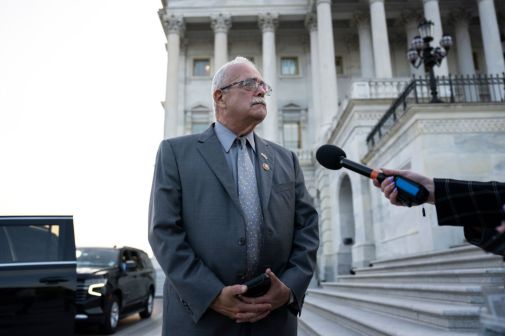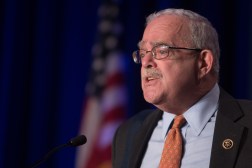FITARA law is failing to give IT chiefs the power of the purse, insiders say

Even though there is a law designed to give Cabinet-level IT heads control over their departments’ tech spending, people working on the law’s implementation told FedScoop it hasn’t been powerful enough yet to fix the problem at every agency.
While a private-sector chief information officer is typically responsible for managing his or her company’s information technology investments, that authority in government is decentralized into different components, said Frank Baitman, former chief information officer of the Department of Health and Human Services.
Those components, Baitman told FedScoop, are given “remarkable” control over their own budgets by congressional appropriators, even though legislation called the Federal IT Acquisition Reform Act was passed to try to centralize IT investment responsibility.
As Baitman put it, even after FITARA, “The department CIO really has nothing other than the bully pulpit.”
The federal IT community saw a striking example when the Transportation Department’s CIO failed under a scorecard designed to track implementation of the law. That official, Richard McKinney, told FedScoop there is more to the story on the department’s failing grade.
McKinney, who left at the end of the Obama administration, said that not only he was unable to control about three-quarters of the department’s IT budget, but that untouchable budget also was chock full of nontraditional IT projects for the Federal Aviation Administration that seek to bring new technology into the national airspace.
“FAA is three-quarters, 80 percent of our IT spend, and I can’t impact it. So I’m being graded over things that…. I have no say-so over,” said McKinney, who was an advocate for the enactment of FITARA. “The truth is I had done pretty well. My boat had gotten swamped by the FAA numbers.” (McKinney was quick to say that FAA is not “bad at IT,” but the agency’s IT is “so different” when compared to much of the rest of the government.)
Baitman — who was at HHS nearly four years until 2015 and was the CIO for the Social Security Administration for two years before that — said McKinney’s situation is not unique. Indeed, during a House committee hearing in December it was revealed that Department of State CIO Frontis Wiggins only controls 50 percent of the department’s IT budget.
Gaps in the workflow
Baitman points to a few areas where FITARA is disconnected from how authorization and appropriations bills are produced on Capitol Hill. First off, the legislation was written by the House Oversight and Government Reform Committee, but most federal agencies are overseen by other committees — “and it’s not really clear” that those panels bought into FITARA, he said.
“So I don’t believe that FITARA has really addressed the fundamental problem,” Baitman said. When a department IT chief tries to exercise control over part of the budget, the affected “operating division” then goes to appropriators and “complains because they’re not able to use the money that was appropriated to them for how they see fit. And ultimately that undermines the intent of FITARA,” he said.
FITARA was put in place about a year before Baitman left HHS, but after talking to colleagues at a variety of agencies, he told FedScoop he doesn’t think the law has brought about any change.
“You need to look at sort of the fundamental politics that drives this. There’s a lot of money at stake in agency IT budgets. A lot of money. And the appropriators like to exercise some influence over how that money is used. And very often that results in IT contracts going to companies in their local districts,” he said. “So the appropriators would have seen a loss of influence if part of the budget that they appropriate is suddenly being decided upon by the department CIO as opposed to the division CIO.”
While it’s important for the people close to the program to influence how money is being spent around the project, at the end of the day Baitman said there has to be one person who can be held accountable for IT spending.
“They have to have a lot of influence but ultimately someone has to be held accountable. You can’t have shared accountability,” he said. “You need to have one throat to choke.”
The FAA dilemma
After FITARA’s enactment, DOT and FAA lawyers looked it over and determined that it gave McKinney’s office control only over the HR aspect of FAA’s IT funding. The DOT CIO could approve FAA’s IT chief but not the related budget, McKinney told FedScoop.
“If my legal counsel tells me, ‘Hey Richard, this is where your nose ends, this is as far as you can go,’ I can’t just say, ‘no, no, no, no, I know better,'” McKinney said, adding later: “If the representatives think FITARA should have trumped that, I would respectfully suggest that it should have been a part of the law, in a sentence to call that out.”
The Transportation Department, which dropped from a D grade to an F+ in December’s report, was the only agency to fall in its scoring and the only recipient of a failing grade. David Powner, director of IT Management Issues at the Government Accountability Office, will tell you that he was “pretty outspoken” at a hearing around the scores about McKinney’s contributions to federal government.
“Richard McKinney at DOT is one of the best CIOs that we have. But he has a situation there at the Department of Transportation that’s very difficult that he inherited, but it’s not from his efforts,” Powner said at the hearing. “And even though he has an F, he deserves a lot of credit for what he’s done.”
Powner said in an interview with FedScoop this week that he stands by those remarks, and that he sat down with McKinney after the scores came out to discuss them.
“Certain CIO positions across the board have stronger CIO authorities than others, and clearly the DOT CIO has certain authorities, but it’s kind of like FAA has historically been a one-off,” Powner said. “And so that makes it — it’s difficult to insert yourself and help them manage it. That’s the culture there.”
The Federal Aviation Administration did not respond to requests for comment.
What to do?
When it comes to FITARA overall, Powner said: “I hear a lot of positive things, I’m doing work now with the Oversight and Government Reform Committee where a lot of CFOs and CIOs are saying hey you know what, the communications are much improved post-FITARA and we hear some positive things from the procurement organizations, the contracting shops, the relationship with the CIO or the CIO’s more aware of IT contracts that are being signed. And that’s kind of the intent there, that there’s more awareness here across those organizations because it’s clearly an area that needed room for improvement.”
FedScoop asked two members of the House about DOT’s most-recent scorecard, whether FAA is to blame and whether the scorecard maybe doesn’t work for all agencies.
“When I took over the subcommittee there was no effort underway to get an objective idea on where agencies were on implementing FITARA,” said House Subcommittee on Information Technology Chair Rep. Will Hurd, R-Texas in a statement. “The scorecard provided a baseline for Congress and agencies to build upon. This is an ongoing process for agencies, just as it is for congressional oversight, as we work to fix our broken federal IT system.”
And Rep. Gerry Connolly, D-Va., who helped pen the legislation, said via email that the FITARA scorecard “is not meant to be a scarlet letter.”
“I am aware of concerns from the Department of Transportation’s leadership that they believe they face unique circumstances in bringing the agency into FITARA compliance,” he said. “As we work to build on and improve the application and metrics of the scorecard, we remain open to working with agencies to address individual challenges they may face in subsequent assessments. The bottom line is that FITARA is a framework for much-needed reform, and we must ensure that it is implemented.”
Baitman, the former HHS CIO, said Congress must enable leaders to do things in the most efficient way possible, “and they’re not doing that today with IT.”
“They also need to hold those people accountable for performance, and they’re not doing that either because I think there’s a recognition that if you’re not giving them authority you can’t hold them accountable,” he said. “You wouldn’t manage in private industry that way and I don’t think you should be doing that in government either.”
According to Baitman, it all comes down to the appropriators.
“No one really wants to say things are being done inefficiently or ineffectively intentionally,” he said. “But it is intentional — people want to exercise influence over the dollars and when they do so, there’s a consequence.”






